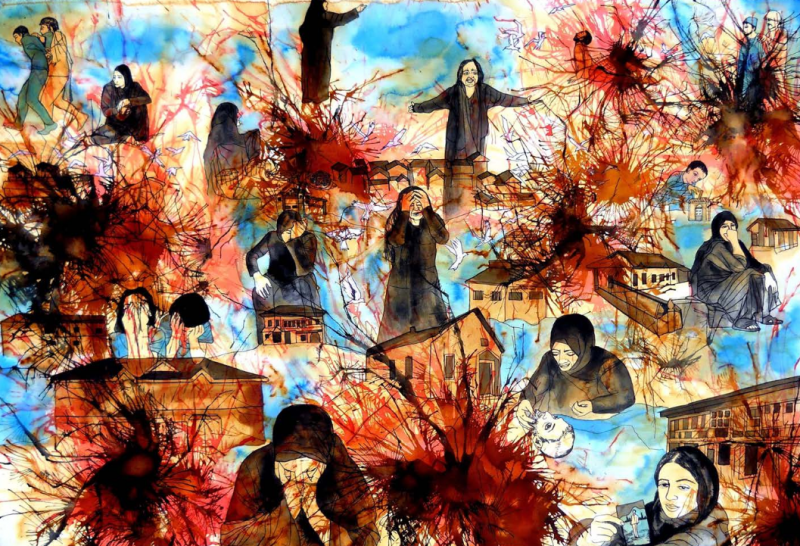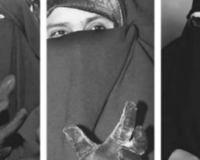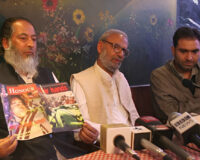Sheikh Farkhanda
In the larger discourse of direct, structural and cultural violence, women in this occupied region are often neglected.
An ugly experience that all women in Kashmir have faced is from that of omnipresent uniformed men dotting every street and corner and passing lewd remarks. The gun in the hands of these occupational forces is a symbol of impunity and endless power. This is enough to silence the voices in any shape and form.
The first ever lesson that every woman is given is to be aware of her vulnerability in militarization and the toughest struggles that she will have to undergo to protect herself from becoming a victim of a systematic military operation. The use of rape as a weapon of war is not just a threat but existential reality in Kashmir. While young women in a parallel universe begin to witness myriad life-freshening experiences, women in this part of the world are exposed to a militarized environment where they breathe occupation and live war!
Women in this territory have been at the receiving end of horrendous violence. They have borne numberless losses. In fact, every loss in this conflict is a loss to a Kashmiri woman – from losing her husband, brother, father, son, and daughter to watching her dear ones disappear in the thin air. As a mother, daughter, wife, and sister, she has always borne the brunt of the military occupation in subtlest forms. She has been at the center of the conflict ever since the Indian state illegally landed its forces in Kashmir.
Despite tremendous hardships, Kashmiri women have vociferously resisted Indian rule in the region and constantly challenged the convenient labels of victimhood. During all these years of turmoil and decades-long struggle, they have refused to give up and thereby continuing their tremendously significant participation in the struggle for right to self-determination. Although the agency of women in resistance politics has often been overlooked by people, women in the valley have historically resisted the occupation of their motherland in numerous ways. They have remained at the forefront of freedom struggle by participating in large-scale mobilizations and demonstrations. Women in the valley have spearheaded the freedom struggle under the banner of Dukhtaran-e-Millat (DeM) led by Asiya Andrabi who is in India’s infamous Tihar Jail since 2018, Muslim Khawateen Markaz (MKM) led by Yasmeen Raja, and Mass Movement Jammu and Kashmir led by Farida Behanji. All these women resistance leaders and their female workers across Jammu and Kashmir have been fighting for their inalienable right to self-determination since decades. These brave women carry armed fighters in their wombs and tell them the tales of martyrdom and resistance. In May 2018, the mother of a prominent armed fighter gave a gun salute to her son at his funeral. She fired a volley of bullets in the air where thousands of people had gathered to offer funeral prayers of Saddam Paddar and Bilal – two armed resistance fighters who were martyred in a fierce gun battle with Indian army in Shopian, south of Kashmir. The incident was the strongest political statement a woman in a place like Kashmir can ever make.
23 February is marked as Kashmiri Women’s Resistance Day in commemoration of the struggle for the survivors of Kunan Poshpora where more than sixty women regardless of their age were raped by a battalion of the 4th Rajputana Rifles on 23 February 1991 in twin villages of Kupwara district, north of Kashmir. The perpetrators, a unit belonging to 68 Mountain Brigade of Indian Army came to conduct a ‘Cordon and Search operation’ in the adjacent villages of Kunan and Poshpora and took men away to a nearby field where they were tortured until dawn. In the dead of night, women as old as 60 and girls as young as 13 were raped in this northern district of the occupied territory. While this was one of the most brutal assaults on the Muslim women of Jammu and Kashmir, it was certainly not the only one. Indian Army has always used rape as a weapon of war in the region. Rape has been a part of India’s counter-insurgency strategy in the region where the omnipresent and dreadful military men, in a systematic manner, sexually assault women to humiliate and degrade the native population in order to diminish their self-worth and community standing besides using it as a form of punishment against local people whom they perceive to be supporting the demand for Azadi. Indian state has continuously rejected any accusation of rape and sexual harassment in the valley terming the allegations as hoax. No military or paramilitary man during all these years of conflict has been convicted of any such offense in the region. Justice is a hard thing to find here.
How do you make sense of a situation where people live in an inherently unjust dispensation with an overwhelming number of occupying military forces having unquestionable powers with guaranteed impunity are ready to pounce upon women under an officially recognized military strategy? The world must know the immeasurable pain and suffering of Kashmiri women, and we should highlight the suffering as well the resilience of this vulnerable community on every platform across the globe. The international legal framework should be strengthened to clearly criminalize the use of rape as a weapon of war and hold perpetrators accountable for their actions. Kashmiris deserve unconditional support of the world in their fight for right to self-determination. Kunan Poshpora is part of a decades-long story of the brazen use of violence perpetrated by Indian state in the form of killings, torture, extrajudicial killings, mass rapes, enforced disappearances, mass graves, illegal detentions, and mass blinding against the demand for Azadi.
Sheikh Farkhanda is a media student at International Islamic University, Islamabad and hails from Indian Occupied Kashmir






